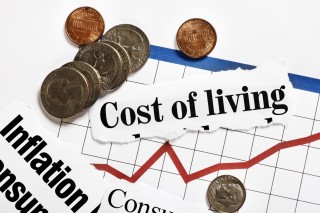The latest inflation report from the National Bureau of Statistics (NBS) shows that the year-on-year inflation rate in Nigeria rose to 11.37 percent in April 2019, against 11.25 percent rate recorded in March 2019, up by 0.12 percent. This is the highest rate since January. The rise in April’s inflation was propelled by a sharp increase in food prices and other items, with the highest increases recorded in the prices of medical services, dental services, tobacco, vehicle spare parts, major household appliances, etc.
According to the data released by the NBS, the food price index shows inflation at 13.70 percent in April compared with 13.45 percent recorded in March. Part of the report reads, “On a month-on-month basis, the food sub-index increased by 1.14 percent in April 2019, up by 0.26 percent points from 0.88 percent recorded in March 2019. The average annual rate of change of the Food sub-index for the twelve-month period ending April 2019 over the previous twelve-month average was 13.34, 0.08 percent points from the average annual rate of change recorded in March 2019 (13.42).”
The rise in the food index was caused by increases in prices of meat, fish, oils and fats, bread and cereals, milk, cheese and egg, potatoes, yam, and other tubers, fruits and vegetables. The index for core inflation (all items less farm produce) during the month of April dropped to 9.3 percent, down by 0.2percent when compared with 9.5 percent recorded in March. On a month-on-month basis, the core sub-index increased by 0.70 percent in April, up by 0.17 percent when compared with 0.53 percent recorded the prior month.
How the states fared
At the state level, core inflation (all items inflation) in the month of April was highest in northern states. The top states with the highest inflation rate include Kebbi (14.82 percent), Bauchi (14.42 percent), and Zamfara(13.99 percent), while Abia(10.12 percent), Delta(9.94 percent), and Cross River(9.48 percent) recorded the slowest inflation rise in headline year on year inflation.
Similarly, food inflation on a year-on-year basis was highest in Kaduna (16.77 percent), Kebbi (16.75 percent) and Kwara (16.34 percent), while Rivers (12.01 percent), Bayelsa (11.25 percent) and Kogi (10.49 percent) recorded the slowest rise in food inflation.
The inflation means that the consumer purchasing power of Nigerians has reduced and, as a result, several individuals and businesses will bear the additional cost. This rise in April’s inflation rate follows defining events like the implementation of the national minimum wage and the ongoing Muslim fast, both being factors which cause a shift in consumer behaviour.
Inflation had dropped for three consecutive months, from 11.37 percent in December, to 11.25 percent in March 2019. Right now, food prices are still at high levels and might remain so for the next couple of weeks as a result of the aforementioned factors. However, Nigerians would expect that the indices that directly affect their daily life will get back to the desired levels.








